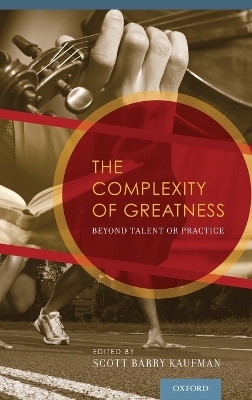
The Complexity of Greatness
Oxford University Press Inc (Verlag)
978-0-19-979400-3 (ISBN)
What are the origins of greatness? Few other questions have caused such intense debate, controversy, and diversity of opinions. In recent years, a large body of research has accumulated that suggests that the origins of greatness are extraordinarily complex. Instead of talent or practice, it's talent and practice. Instead of nature or nature, it's nature via nurture. Instead of practice, it's deliberate practice. Instead of the causes of greatness in general, it's the determinants of greatness specific to a field. The Complexity of Greatness brings together a variety of perspectives and the most cutting-edge research on genes, talent, intelligence, expertise, creativity, prodigies, savants, mindset, and grit. A variety of different domains are represented, including science, mathematics, expert memory, acting, visual arts, music, and sports. This book demonstrates that the truth about greatness is far more nuanced, complex, and fascinating than any one viewpoint or paradigm can possibly reveal. Indeed, it suggests that the time has come to go beyond talent or practice. Greatness is much, much more.
Scott Barry Kaufman is Adjunct Assistant Professor of Psychology at New York University. He completed his doctorate in cognitive psychology at Yale University in 2009. He also holds degrees from University of Cambridge and Carnegie Mellon University.
Preface ; Scott Barry Kaufman, New York University ; Part One: Perspectives ; 1. Where Does Greatness Come From: A Treasure Hunt Without a Map ; Samuel D. Mandelman, Teachers College, Columbia University and Elena L. Grigorenko, Teachers College, Columbia University, Yale University, Moscow State University ; 2. Greatness as a Manifestation of Experience-Producing Drives ; Wendy Johnson, University of Edinburgh ; 3. If Innate Talent Doesn't Exist, Where do the Data Disappear? ; Dean Keith Simonton, University of California at Davis ; 4. Whither Cognitive Talent?: Understanding High Ability, its Development, Relevance and Furtherance ; Heiner Rindermann, TU Chemnitz, Stephen J. Ceci and Wendy M. Williams, Cornell University ; 5. Young and Old, Novice and Expert: How We Evaluate Creative Art Can Reflect Practice or Talent ; James C. Kaufman, California State University at San Bernardino, John Baer, Rider University, and Lauren E. Skidmore, California State University at San Bernardino ; 6. Prodigies, Passion, Persistence, and Pretunement: Musings on the Biological ; Bases of Talent ; Martha J. Morelock, Vanderbilt University ; 7. Savant Syndrome: A Compelling Case for Innate Talent ; Darold A. Treffert, University of Wisconsin ; 8. Mindsets and Greatness: How Beliefs About Intelligence Can Create A ; Preference for Growth Over Defensiveness ; Paul A. O'Keefe, New York University and CUNY Graduate Center ; Part Two: Debate ; 9. Giftedness and Evidence for Reproducibly Superior Performance: An Account ; Based on the Expert Performance Framework (REPRINT) ; K. Anders Ericsson, Roy W. Roring, and Kiruthiga Nandagopal, Florida State University ; 10. Yes, Giftedness (aka <"Innate>" Talent) Does Exist! ; Francoys Gagne, Universite du Quebec a Montreal ; 11. Gagne is Omitting Troublesome Information so as to Present More Convincing Accusations: His Accusations Along with My Own Exploration of the Evidence for Innate Talent ; K. Anders Ericsson, Florida State University ; Part Three: Domains ; 12. Scientific Talent: Nature Shaped by Nurture ; Gregory Feist, San Jose State University ; 13. The Promise of Mathematical Precocity ; Linda E. Brody, Johns Hopkins University ; 14. Memory Expertise or Experts' Memory? ; John Wilding, University of London ; 15. Practice and Talent in Acting ; Helga Noice and Tony Noice, Elmhurst College ; 16. The Rage to Master: The Decisive Role of Talent in the Visual Arts (UPDATED REPRINT) ; Ellen Winner, Boston College and Harvard Project Zero; Jennifer E. Drake, Boston College ; 17. Music in Our Lives ; Jane Davidson and Robert Faulkner, University of Western Australia ; 18. Creating Champions: The Development of Expertise in Sports ; Paul R. Ford, Nicola J. Hodges, and A. Mark Williams, University of British ; Columbia ; Epilogue: Michael Howe Remembered ; Jane Davidson, University of Western Australia; John Sloboda, Keele University; and Stephen Ceci, Cornell University
| Verlagsort | New York |
|---|---|
| Sprache | englisch |
| Maße | 236 x 160 mm |
| Gewicht | 794 g |
| Themenwelt | Geisteswissenschaften ► Psychologie ► Allgemeine Psychologie |
| Geisteswissenschaften ► Psychologie ► Verhaltenstherapie | |
| ISBN-10 | 0-19-979400-6 / 0199794006 |
| ISBN-13 | 978-0-19-979400-3 / 9780199794003 |
| Zustand | Neuware |
| Informationen gemäß Produktsicherheitsverordnung (GPSR) | |
| Haben Sie eine Frage zum Produkt? |
aus dem Bereich


